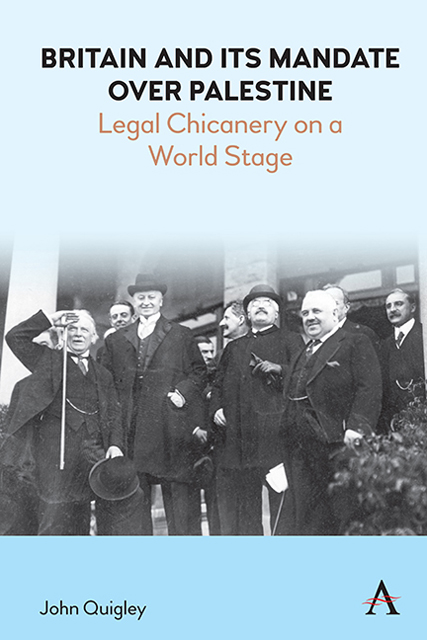Book contents
- Frontmatter
- Contents
- Preface
- Setting the Stage: Was Britain’s Rule in Palestine Legal?
- 1 The Balfour Declaration Is the Focal Point for the Legal Situation of Palestine
- 2 The Balfour Declaration Was a Binding Commitment to the Jewish People
- 3 The Jewish National Home Meant a Jewish State
- 4 The Balfour Declaration Was Issued to Affirm Jewish Rights in Palestine
- 5 The Paris Peace Conference Raised Jewish Statehood to the International Level
- 6 Britain’s Allies Made the Balfour Declaration an International Commitment
- 7 Britain’s Allies Endorsed Jewish Rights
- 8 Britain Took on Palestine Because of the League’s Mandate System
- 9 The League of Nations Protected Palestine’s Arab Population
- 10 Britain Was Given Palestine by the League of Nations
- 11 The League of Nations Put the Palestine Mandate into Legal Force
- 12 The Peace Treaty with Turkey Legalized Britain’s Status in Palestine
- 13 The Palestine Mandate Document Was a Treaty between Britain and the League
- 14 The League of Nations Required Britain to Implement the Balfour Declaration
- 15 The Palestine Mandate Document Implemented the League Covenant
- 16 The Palestine Mandate Document Recognized Jews as a National Group
- 17 The Palestine Mandate Document Bound Britain to the Balfour Declaration
- 18 The International Community Committed Itself to the Balfour Declaration
- 19 Britain Held Legal Status in Palestine
- 20 The United Nations Charter Carried Forward a Jewish Entitlement to Statehood
- Postscript: Why History Matters
- Documents Annex
- Notes
- Bibliography
- Index
11 - The League of Nations Put the Palestine Mandate into Legal Force
Published online by Cambridge University Press: 10 January 2023
- Frontmatter
- Contents
- Preface
- Setting the Stage: Was Britain’s Rule in Palestine Legal?
- 1 The Balfour Declaration Is the Focal Point for the Legal Situation of Palestine
- 2 The Balfour Declaration Was a Binding Commitment to the Jewish People
- 3 The Jewish National Home Meant a Jewish State
- 4 The Balfour Declaration Was Issued to Affirm Jewish Rights in Palestine
- 5 The Paris Peace Conference Raised Jewish Statehood to the International Level
- 6 Britain’s Allies Made the Balfour Declaration an International Commitment
- 7 Britain’s Allies Endorsed Jewish Rights
- 8 Britain Took on Palestine Because of the League’s Mandate System
- 9 The League of Nations Protected Palestine’s Arab Population
- 10 Britain Was Given Palestine by the League of Nations
- 11 The League of Nations Put the Palestine Mandate into Legal Force
- 12 The Peace Treaty with Turkey Legalized Britain’s Status in Palestine
- 13 The Palestine Mandate Document Was a Treaty between Britain and the League
- 14 The League of Nations Required Britain to Implement the Balfour Declaration
- 15 The Palestine Mandate Document Implemented the League Covenant
- 16 The Palestine Mandate Document Recognized Jews as a National Group
- 17 The Palestine Mandate Document Bound Britain to the Balfour Declaration
- 18 The International Community Committed Itself to the Balfour Declaration
- 19 Britain Held Legal Status in Palestine
- 20 The United Nations Charter Carried Forward a Jewish Entitlement to Statehood
- Postscript: Why History Matters
- Documents Annex
- Notes
- Bibliography
- Index
Summary
In 1947, when it approached the United Nations for advice about Palestine, the British Government felt constrained to explain its status there, and how the Palestine mandate could be seen as a lawful exercise of authority. In a memorandum it prepared for the United Nations about the mandate, the Government wrote:
The terms of the draft Mandate for Palestine were approved by the Council of the League of Nations on the 24th July, 1922. At that time peace had not been concluded between the Allied Powers and Turkey. It was not until the 29th September, 1923, after the Treaty of Lausanne had entered into force, that the Council of the League was able formally to give effect to the Palestine Mandate.
Britain here confirmed that the League Council action of 24 July 1922 related only to the mandate's terms, but that it was not an action that held legal significance for Britain having a mandate, since peace with Turkey was yet to be concluded. That distinction has been missed by many analysts, including Shabtai Rosenne, the first Legal Adviser to Israel's Foreign Ministry. Rosenne wrote that “the Mandate for Palestine was confirmed by the Council of the League of Nations and entered into force on 24 July 1922.” As the 1947 British document correctly stated, however, the Council did not purport to confirm a mandate to Britain on 24 July 1922, or to give it any legal effect on that date.
Fourteen months later, on 29 September 1923, the Council did purport to give “effect” to the mandate itself. In 1945, on another occasion when the British Government was explaining its status in Palestine, it said that on 29 September 1923 the mandate “came formally into operation.” The British Government never clarified what this characterization meant. The Crown had, as we saw, announced a mandate on 1 July 1920. Was the mandate “provisional” in some sense for three years? Was it only an “informal” mandate, if such a term had any legal meaning? If the mandate lacked “effect” prior to 29 September 1923, did Britain regard itself as a belligerent occupant until that date, despite what it said on 1 July 1920?
- Type
- Chapter
- Information
- Britain and its Mandate over PalestineLegal Chicanery on a World Stage, pp. 79 - 88Publisher: Anthem PressPrint publication year: 2022

